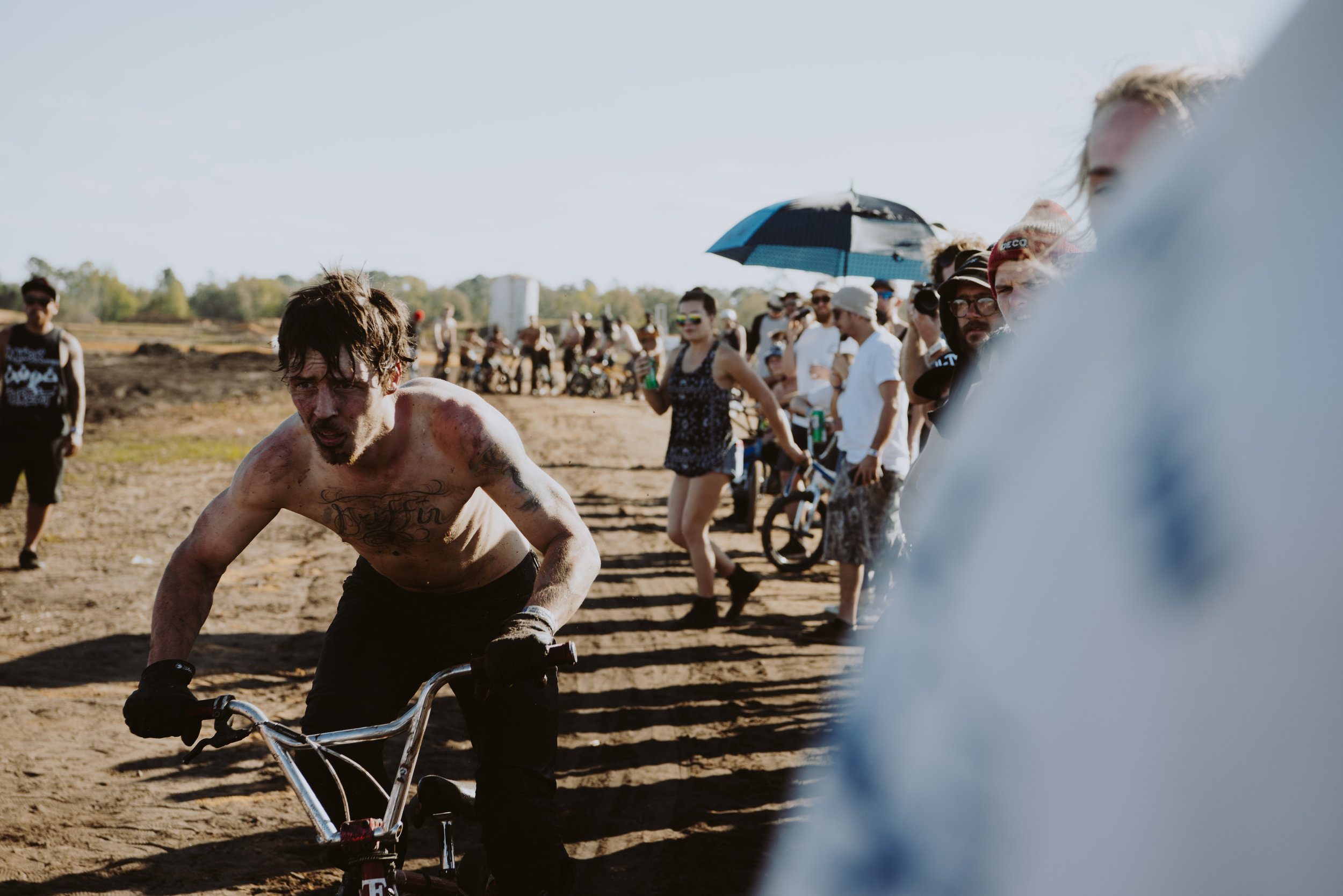

It was the week of the Parkland shooting, and two photographers and a writer needed a diversion — just one night to think about something else. They found it in the Astatula muck.
Photos by Growl | Words by Charles Bethea

There’s no predicting the strange sequence of events that come to shape our lives. Sometimes, the grotesque and the glorious arrive hand-in-hand.
A few months ago, driving south from Atlanta to Parkland, Florida, to write about the shooting at Marjory Stoneman Douglas High School, I stopped off one night in a remote field in Astatula, Florida, a hamlet near Orlando. Earlier that day, as I drove, I’d spoken with sobbing kids I’d never met, whose friends and classmates had been gunned down at school. I needed a place to sleep, but also an emotional diversion.
I heard the dull hum of generators as I approached the field, but failed to find much in the way of event signage. My friends Chris and Justin, who’d told me about this thing called the “Florideah Swamp Fest,” which happened to be along my route to Parkland, were already there, looking muddy — except for their cameras, whose lenses they continually wiped — and mischievous. Metal played in the middle distance as they welcomed me.
“What up,” Chris said, his arms outstretched.

It was hard to say, exactly. But I hadn’t come empty-handed. He’d asked me to pick up supplies — water and beer — to which I’d added a “bed-in-a-bag” from a nearby Dollar Store, since sleeping in a field hadn’t been on my original itinerary. We headed into a cloud of dust — toward a scattering of tents, and, a bit further, a few brightly lit acres of dirt where mostly young men flew through the air with what seemed, at best, a tenuous grip on their bicycles — and that’s where we stayed for the next 12 hours, until I hit the road again.


Florideah is an annual back-road BMX cycling event that draws a few hundred mostly young riders from around the margins and interstices of the South, and a few from beyond, to a communal, DIY uprising of wooden ramps, dirt-packed jumps, and mud pits. The participants don’t ride carbon steeds crafted by Cannondale. They pedal — and entrust their lives — to jury-rigged, banged-up, idiosyncratically stickered, and hand-welded hunks of heavy metal. Little money is made. (Entry for the weekend, which included camping, was $25.) NBC isn’t televising, and Red Bull isn’t underwriting. Blood and beer are spilled, maybe in equal measure. It’s a “Mad Max”-ian, anarchic antidote to the modern corporate sporting event. In the parlance of its practitioners, it’s a “jam,” meaning, basically, the point is to have fun. One spectator likened it to a “BMXers’ Woodstock.”

I joined a dozen teens sitting atop a shipping container that doubled as a launch pad for cyclists riding a sequence of jumps. One of them, after verifying I wasn’t “a narc,” passed me a joint. The cloudy got clearer. I watched multiple generations of family riders, including a father and son with matching knee gashes. I witnessed up close my first banked, gravity-defying “wall ride.” I saw a dude wearing a beer costume soaring through the sky doing a "tuck no-hander," and his buddy pulled a “can-can.” I saw the bloody face, under a MAGA beer helmet, of a man who’d gotten worked on the roll-in from the container to the first jump. I saw wooden ramps riotously turned to firewood, and a massive bonfire erupt. It, too, became an obstacle. A few brave young men took tequila shots out of an old man’s navel as he lay writhing in the dirt. Elsewhere, intoxicated by some combination of flying cyclists and uncontrolled substances, the crowd cheered, especially for the youngest kids who made it through their sets.
I didn’t sleep much that night. The “bed-in-a-bag” turned out to be worth what I’d paid for it: $19.99. And our campsite neighbors pulled midnight doughnuts around our tents, in their trucks, before loudly analyzing Kurt Russell’s filmography until dawn. But when I arose and looked around at the detritus of the night before, I found reason to have hope for the days to come. And I drove on to Parkland. — Charles Bethea





























